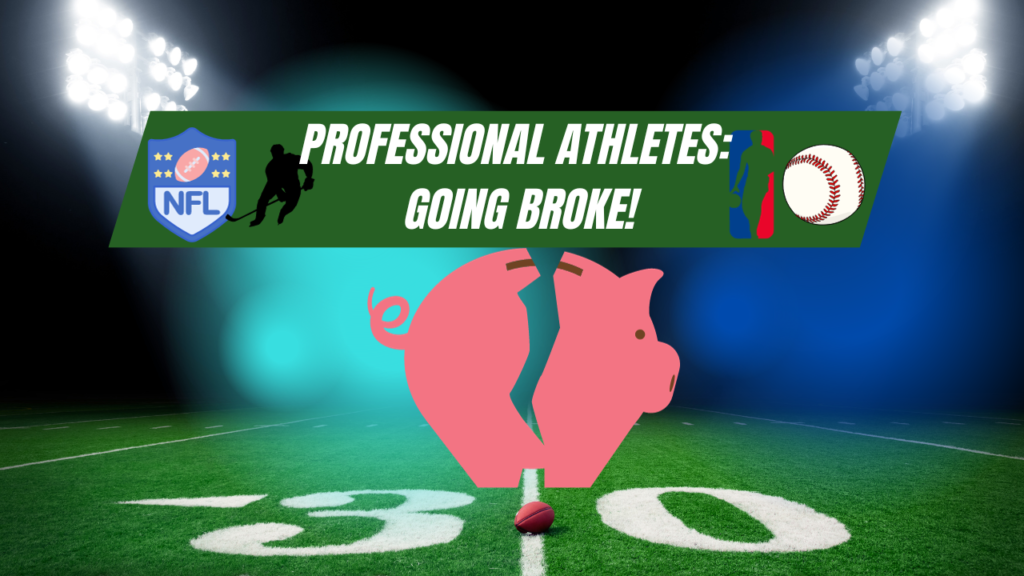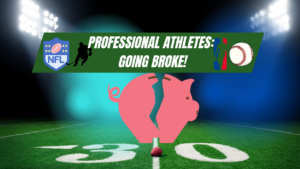The Playbook of Financial Challenges: Why Pro Athletes Often Go Broke
by, Jeremy Reif, CRPS
Learning from their mistakes, we can understand the value of seeking professional financial guidance and building a secure financial foundation for life after sports. Many young children look up to professional athletes. Understandably so, professional athletes are undeniably among some of the highest-earning individuals in society, with contracts often reaching millions of dollars. While this financial prosperity can be a dream come true, it also comes with unique challenges and responsibilities that require even more serious consideration than the average person. Athletes typically have relatively short careers, and their incomes can vary significantly from year to year due to contracts, endorsements, and other factors. This volatility highlights the importance of careful financial planning to ensure long-term security.
Studies have been done many times, but the results still seem to be the same decades later. The temptation to lead a lavish lifestyle during their playing days can be irresistible for many athletes. Ahh, to be rich and famous. People come crawling out from under rocks and out of the woodwork to leach, which in turn can lead to spending more. It is a tough position to be put in, they are professionals, but usually not in finance.
History bears the truth; this can happen in any industry not just sports. It’s essential to strike a balance between enjoying their earnings and planning for a financially stable future. By taking their finances more seriously, professional athletes can not only secure their post-retirement years but also set an example for fans and aspiring athletes, highlighting the importance of financial literacy and prudence in an unpredictable financial landscape.
Understanding the psychology of money. For argument’s sake, let’s assume that a professional athlete and a normal businessperson over their lifetime earn the same total. In essence, their earnings are the exact opposite of each other. Earning big money early in a career can give a false sense of security. Often lifestyle can get out of hand early and the money behaviors of spending foolishly can have long-lasting effects. On the other hand, getting a degree and working an entire career, often the worker makes less early in their career and more towards the end. Learning to budget early, can often lead to better money habits and often building savings and emergency reserves. Later in their career, more money is made, but often the lifestyle is lower because they started off lower, thus allowing them to save more later in life. Whereas the professional athlete has always been at an expensive lifestyle, saved early, but might make little or no income until they can’t afford it.
Professional athletes face a distinct set of financial challenges that distinguish them from the average person. One of the most prominent challenges is the shortness of their careers. While the public often sees the glitz and glamour of sports stardom, many athletes retire in their late twenties or early thirties, leaving them with several decades of life ahead to financially support themselves and their families. To remind you, the normal retirement age is 65. The typical retirement lasts 20-25 years. For these athletes, their money must last 30-40 years longer. This stark contrast to a traditional career trajectory necessitates careful financial planning from day one.
The allure of a luxurious lifestyle during their peak earning years can be overwhelming for athletes. With substantial incomes, they might be inclined to indulge in above-average purchases like luxury cars, mansions, and designer clothing. Some athletes during their professional careers also support their own entourage and or bodyguards. However, it’s vital to strike a balance between enjoying their wealth and saving for the future. This temptation to overspend, often fueled by peer pressure and societal expectations, can lead to financial woes down the road if not managed responsibly.
Let’s dive deeper into only one facet of the above-described lifestyle, a mansion. A mansion for all intents and purposes can vary from state to state in price, but it is usually defined as 8,000 square feet or larger. The national average cost per square foot is $225. This would be $1.8M to purchase in 2023. For many athletes, this is not a problem to afford the initial purchase price.
It is the years during retirement that these athletes do not plan for. The national average property tax is 1.31%. Property taxes each year on $1.8M would be $23,580. Many athletes living in the limelight might be in an area that charges higher than the national average. For example, Maimi’s real estate tax rate is 2.06%. Try paying for these real estate taxes for 40 years longer in retirement, that is $943,200 without including a property tax increase. This does not include any utilities, water, maintenance, etc. Larger home also means annual fixed living costs are extraordinarily higher than the national average. Especially when you are expected to retire and maintain a standard of living, but no longer working as a professional athlete and earning the same wages as when in the prime of their careers.
Given the unique financial landscape that athletes navigate, it’s crucial for them to prioritize financial education and literacy. Many athletes come from diverse backgrounds and may not have had prior exposure to managing substantial wealth. Therefore, understanding basic financial concepts, investment strategies, and the importance of living within their means is paramount. Seeking guidance from financial advisors and building a team of experts can help athletes make informed financial decisions and safeguard their long-term financial security.
If it’s widely recognized as essential for professional athletes to hire agents to navigate the complex world of contracts, negotiations, and career management, it should equally be acknowledged that hiring a financial advisor is of paramount importance. Professional athletes, particularly those in the NFL, often earn substantial incomes in a relatively short span of time.
While agents help secure contracts, deals, and endorsements, financial advisors play a complementary role by guiding athletes in preserving or not squandering the fruits of their labor. They provide expertise in managing finances, planning, and mitigating financial risks, ensuring that athletes not only make the most of their earnings during their playing careers but also secure their financial well-being long after they hang it up. In essence, just as agents are instrumental in shaping an athlete’s professional career, financial advisors are integral in safeguarding their financial future, making their role equally indispensable in the world of professional sports.
Encouraging these athletes to continue their education and get a job of course is always another great way to ensure that they have something to fall back on. This is more than likely already the case because of how the following numbers work out. An old NFL example: About 78% of NFL players lose their money and go broke one way or another, but only about 15% of them file for bankruptcy. In the rest of the United States, less than 2% of Americans file for bankruptcy and 58% are living paycheck to paycheck. Merely pointing out that there is room for improvement.
Change is needed to protect the athletes from themselves. The old way isn’t working. Instead of hoping and praying that these athletes don’t repeat mistakes from their predecessors, I propose they should be treated differently with their finances from the start. Make it mandatory to hire a planning firm or RIA that is outside of the sports industry to protect them from the good ol’ boys club and buddy systems that are currently in place. Make financial education a required course. Teach them before they learn bad spending habits.
sources:
Life Expectancy Assumptions In Retirement Plans – Singles, Couples, And Survivors
https://www.pacaso.com/blog/how-much-does-a-mansion-cost
https://www.mansionglobal.com/articles/here-s-how-much-tax-you-ll-pay-on-a-2-million-home-in-each-u-s-state-25882
https://vault.si.com/vault/2009/03/23/how-and-why-athletes-go-broke
https://www.cbsnews.com/news/1-in-6-nfl-players-go-bankrupt/
https://www.debt.org/bankruptcy/statistics/
https://www.cnbc.com/2023/04/11/58percent-of-americans-are-living-paycheck-to-paycheck-cnbc-survey-reveals.html


